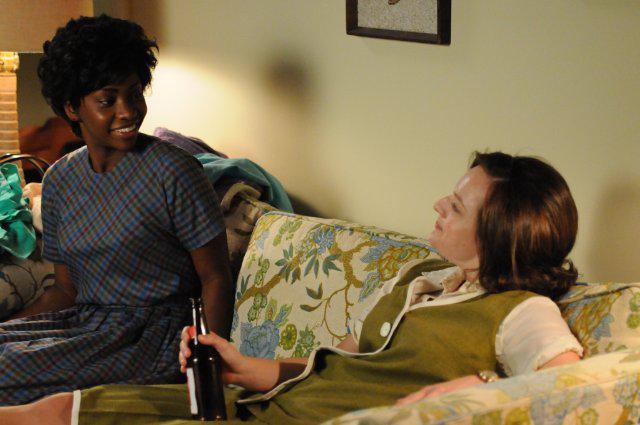Much has been made of Mad Men’s tentative handling of racial tensions in the 1960s. The arrival of each new season brings the same anticipation that race may finally be brought to the forefront of the series. But while most of us who don’t work on the show are generally content to call attention to Mad Men’s lack of diversity and leave it at that, actress Erika Alexander has gone above and beyond: She wrote a 45-page spec script titled “Uptown Saturday Night,” which incorporates a variety of black characters into the world of Don Draper and company.
Alexander is best known for her roles on The Cosby Show and Living Single and will soon appear on what could be “the next great AMC series.” She’s an avid fan of the Matthew Weiner-created drama. But as a black performer, she’s more than a bit disappointed in the show’s prevailing whiteness. “Why did I write an episode of Mad Men with negroes?” she asked herself on her blog. “And by that I mean with ‘negro’ characters in it, not with… Why did I write an episode of TV that I know will never be made?” Her answer: When showrunners like Weiner or Girls creator Lena Dunham suggest that their creative work might suffer if it were motivated by “white guilt” or “tokenism,” they are, in Alexander’s view, taking an easy and unconvincing way out.
Alexander’s goal for the screenplay was to incorporate black characters “organically” into Mad Men, to prove that the show’s writers can in fact do so themselves. And overall the script succeeds. “Uptown Saturday Night” picks up around the time of the actual sixth season, and opens with Don en route to 125th Street in Harlem. At first we’re unsure why he would venture to that part of town. It then cuts to two days prior in the Sterling Cooper Draper offices, where Pete Campbell goes off script while pitching to Joseph E. Seagram & Company. “Our market research shows us that currently 13 percent of Seagram’s revenues come from an under-served consumer group,” he says. “Negroes.” While the owner is appalled at the idea, Don, per usual, is able to smoothly convince the client that Seagram’s Seven Crown whiskey should be marketed to a minority demographic.
A black man Roger met in the service recommends the Leon Early Agency as a potential partnership, and Don heads up to Harlem for an introduction. Alexander describes Leon as a “Don Draper type,” who is quite possibly sleeping with his secretary and is definitely as shrewd as our protagonist. Their interaction is one of the script’s highlights, with an especially inspired moment in which they, along with four of Leon’s black employees, rattle off ad ideas and come up with the drink, Seven and Seven. Then during negotiations, Alexander creates the kind of tension Mad Men viewers know and love.
It’s worth reading in full if you’re a Mad Men fan. Other storylines that pop up have nothing to do with black characters—Roger goes on another LSD trip, Megan contemplates divorce while her mother’s in town for a visit. Alexander even brings back a minor character from Mad Men’s past—Burt Peterson, the head of accounts who was first seen being fired by Lane Pryce in Season 3, Episode 1, and never heard from again. (In “Uptown Saturday Night,” we learn that he’s been “demoted” to a job with Leon’s agency, and is doing quite well as the token white face for clients.) The tone and dialogue throughout are just right for the show.
But the episode is at its best when dealing with race. After Pete’s renegade pitch, the partners call in Don’s secretary, Dawn, to ask her opinion of Seven Crown Whiskey. She doesn’t have one, she’s a Jehovah’s Witness; this renders Pete briefly mute. When Don asks Pete whether he even knows any Negroes, Pete replies, “Market research will tell me everything I need to know.”
Alexander explains that, despite growing up in rural Arizona, she had anecdotes to draw on for “Uptown Saturday Night”: Her husband, who is also black, once worked as an art director in an advertising agency, while her “father-in-law was a pioneering black executive in the 1960s.” While it may be hard for Weiner and other white writers to wrap their heads around stories that seem far from their own, Alexander’s script should serve as an example that it’s entirely possible to remain true to a show’s creative vision while pushing outside its usual comfort zone.
